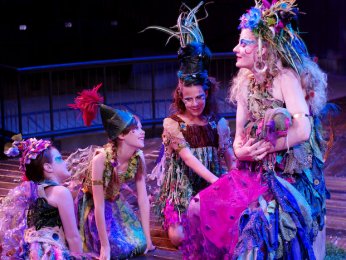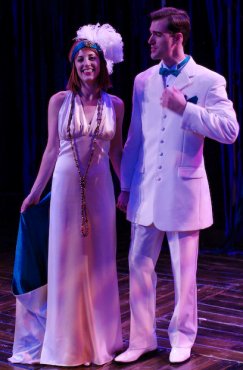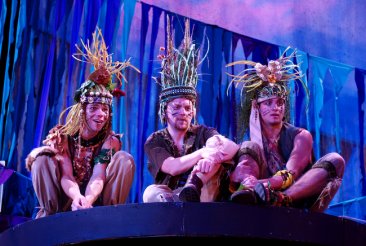Summary 
Outdoor production modernized to New Orleans. A head-scratching array of English accents ranging from Creole, French, Greek, and New York-Italian render the array of characters and situations difficult to follow. Strong supporting performances and an exuberant tone enhance the show, which features carefully constructed resolutions to the central marital conflicts.
Design
Directed by Deb Alley. Costumes by Lauren Lowell. Set by John C. Stark. Lights by R. Lee Kennedy. Sound by Joseph Court. Fights by C. Drew Vidal.
Cast
Wayne T. Carr (Theseus), Josephine Hall (Hippolyta), Brian Rooney (Egeus), Victoria Caciopoli (Hermia), Chris Amos (Demetrius), Cody Proctor (Lysander), Kate Cook (Helena), Raymond L. Chapman (Peter Quince), Robert Gerard Anderson (Bottom), Kevin Rich (Puck), David Kortemeier (Oberon), Michelle Shupe (Titania).
Analysis

Deb Alley's outdoors A Midsummer Night's Dream uses the same basic staging as the Illinois Shakespeare Festival's other repertory productions - panels of dark planks across the stage, a series of wooden ramps, vertical sky-blue screens above the balcony - as well as the same small company of twenty young performers and a single scenic designer. Midsummer Night adds upstage trellis work and decorative pots of flowers and green shrubs at stage right. Traps turn to reveal forest boulders and shrubbery spins to expose a large tree stump platform stage right. Titania's fairies hang purple blue green streamers onstage and across the balcony - like Mardi Gras décor - that billow and blow in the evening breeze.
Alley's production begins with a drum roll and a heated fencing duel, the royal combatants sporting modern attire and attended by Southern-style servants in white tuxedoes. Theseus, a young black man in a trimmed beard, and Hippolyta, a Greek woman with black hair in a pony-tail, both wear athletic white fencing suits with sneakers, black knee pads, and masks. As background music swells - the 20th-century jazz of "I'm In the Mood for Love" - the betrothed couple wages a heated and almost carnal contest: wielding their foils with passion, they almost caress each other, sensually sliding their blades against one another. When he touches her face, she slaps his, and he responds by grasping her hand, but she head-butts him. When Theseus wrestles her to the ground and mounts her, Hippolyta rallies to reverse her fortune, rolling Thesus over and sitting atop him for a victory. They then share a kiss, flinging their gear in pieces behind them to the servants, who scramble to try and catch it all.
This Midsummer Night is modernized and moved to the American South a la New Orleans, and Alley has her performers affect an array of accents to differentiate the characters as well as to delineate their social standing. Theseus, the dashing Duke, delivers his lines in a debonair Gatsby-style drawl, his social standing contrasted with the roaring affectation of Egeus, an old-time southern-gentleman aristocrat who sports a straw hat and a neatly-trimmed beard, spinning a walking cane that serves as a scabbard for a lethal-looking sword. The young lovers, outsiders both in the forest as well as in town, speak with oddly exaggerated New York accents and sound something like stereotypical Italian-American gangsters, with the name "Hermia" sounding like "Hoimia." Hippolyta speaks with a Greek accent, the faerie queen Titania also sounds Eastern European, and her mate Oberon's clipped English carries a thick French accent. The bottom rung of Alley's conception of the Midsummer social order are the hempen homespuns, a motley band of Cajun would-be-actors who spew comically Creole-accented English like Shakespearean versions of Inspector Clouseau. The array of accents - while an interesting concept - are hit and miss when performed onstage, and the varying types and qualities occasionally confuse, making already archaic speech even more difficult to follow, especially for those unfamiliar with Shakespearean drama.

The four young lovers, despite their strange accents, are attractively played, especially the prim Helena, and the characters serve to root the production in modern Louisiana. Lysander, cross-gartered and mustached, appears as though a young plantation heir, albeit somewhat dimwitted, as evidenced by his use of a golf club as defense in the forest, and especially by his spirited bursts of exclamations: "gonna get married!" before the elopement, "I've got her glasses!" in the woods, and at the reading of potential court entertainments, "seen it!" The tall and lanky Demetrius seems like a privileged Deep South prep school student, but when bedeviled in the forest by Puck's spell, he kicks his lengthy legs in a comically silly walk like something from Monty Python's Flying Circus. And Hermia, wearing a silky cream-colored lace dress, heels, and necklace, has the curly hair and complexion of a mulatto to go with her fiery belle temperament: she drops her luggage to Lysander from the balcony and fairly demands the attention of everyone around her. Kate Cook's Helena is radiant in white pants suit and long, straight red hair, a balance of social intelligence and romantic desperation that provides an unexpected anchor to Alley's production. Bespectacled and bookwormish, her sophisticated New Yorker Helena struggles to maintain dignity and poise, albeit deep in the throes of unrequited love and loosed in a magical forest. Even after suffering the derision of pet-owner commands - "stay, stay, stay, fetch!" - she sprawls on the stage facedown like a spaniel for Demetrius, then watches him like a stalker with her binoculars as he runs off after Hermia. When the two boys fawn over her, clutching her hand while following her every move upon their knees, she spins and cows them with an exasperated, "stop!" And once an enraged Hermia is finally subdued by the boys, Cook's Helena is not above taunting, leaning close for a wickedly derisive laugh and a sticking-out of the tongue. Helena becomes almost completely unraveled when Demetrius outstretches his arms to protect her, but inadvertently cups her breast.

In keeping with the New Orleans thematic, the forest sprites cast voodoo hexes on the lovers in the wood. The stage is bathed with purple and blue light, with a big orange full moon above the balcony. Oberon wears leafy brown and orange, and he is black-booted and bare-chested, his Titania wrapped in sheer pink veils, blonde-haired and heavily made-up in pink and blue. Oberon claps his hands to magically bring up yellow lights as Demetrius and Helena arrive, and he shows disapproval of Demetrius' ungallant behavior. The fairies sing Titania a Cajun-style "lullabye" that Oberon mocks as Titania falls asleep, and after Oberon growls to chase away a lingering fairy, Puck arrives and the story becomes energized. Alley derives a strong performance from Kevin Rich as Puck. Rich's Puck is playful and engaging, always smiling or breaking into a giggle, covering his face ("uh oh!") or hiding his eyes in barely restrained glee. His servants - crouching like cats, leaping and shouting and running - aid and abet him in pick-pocketing a handkerchief, stealing a wristwatch to wear as a necklace, and nabbing a much-needed flashlight in the woods. Puck plays puppeteer to Hermia's marionette, guiding her in a comically jerky walk to sleep beside her love Lysander. And given the opportunity to make amends, he nearly gives the magical potion to the wrong Athenian - again - only righted by Oberon's off-stage grunts of "Ah! Ah! Ah!"
The hempen homespuns are nicely underplayed, Alley focusing their humor on their outrageous pseudo-French accents and their appearance. Quince wears black plastic spectacles, a vest, and a ski cap, with bald but bearded Bottom in a neckerchief with a cotton shirt over his white T-shirt, and workman Snug sports a lunch box, tool belt, kneepads, and suspenders. During rehearsal, Flute drops a hammer like a waning erection - "I have a beard...coming" - and Bottom's "translation" (to shouts of "voodoo!" and the tailor's little-girl scream and panicked flight) brings an intermission that segues into a madcap reintroduction of the characters in a parade across the stage from criss-crossing chase sequences.
Bottom's lecherous interaction with the young girls playing Titania's fairies is somewhat unsettling - he seems disturbingly self-entitled and predatory - and the conclusion of the scenes comes as something of a relief. Alley, however, handles the subtleties of the approaching conclusion - especially the reconciliations between Oberon and Titania and between Thesus and Hippolyta - with considerable insight. After the stern-visaged Oberon unravels the romantic entanglements and misfired voodoo in 4.1, a lone pipe plays softly as Oberon and Titania lovingly agree to share their changeling boy. And Theseus makes 5.1 amends with Hippolyta, pointedly checking for her approval at his suggestion of a triple marriage. Hippolyta warmly takes his hand, and the concluding theatrical presentation by the mechanicals is performed with all plot strands comfortably resolved. Theseus returns in a white tuxedo, Hippolyta in a gown, both sipping from flutes of champagne.
The crowd-pleasing conclusion, a rambunctious Pyramus and Thisby, includes Quince's rising fury at the repeated mispronunciation of "Ninus' tomb" and the Moon beginning to weep in a quavering voice when belittled by the newlyweds. Bottom, wearing a strapped-on colander for a war helmet, performs a clumsy rap sequence at the Wall with Thisby, and the Lion gives an exaggeratedly long roar while he struggles to hide Thisby's handkerchief and replace it with a "bloody" one. The amusing silliness culminates with a wailing Thisby grasping Bottom's bottom, then flailing in death throes to expire upside down and backward, his head between Bottom's squirming legs in a comical approximation of a uniquely numerical sexual position. After a brief attempt at a bergomask dance, the players are shooed from the stage for Puck's happy-wave parting words, then the entire cast returns for a spirited curtain call.
Note: A version of this article was edited and published in Shakespeare Bulletin, Vol. 28, No. 2, Summer 2010